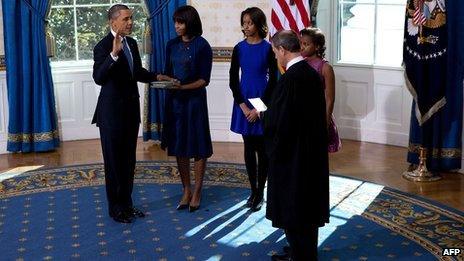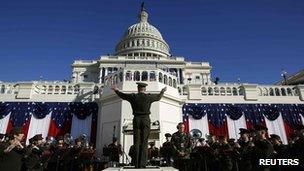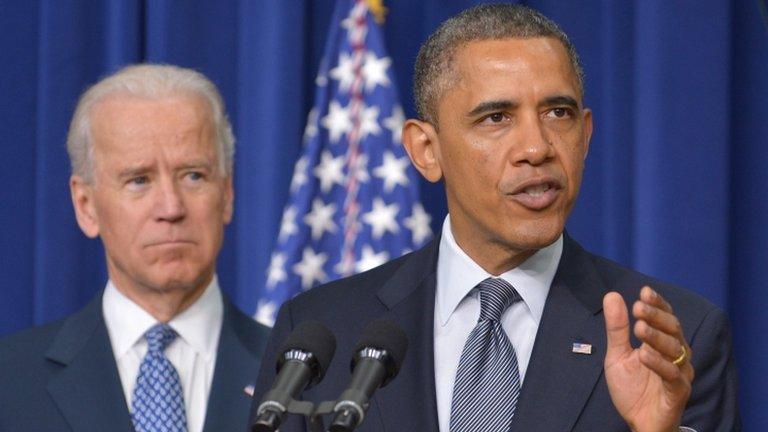Inauguration Day: Unclear strategy for an Obama legacy
- Published

Barack Obama, who was sworn in at a private ceremony on Sunday ahead of Monday's public inauguration, is likely to be more combative in his second term
Washington will suffer happy gridlock on Monday as roads are closed and people arrive from all over the country.
This is a big national celebration, from Beyonce singing the national anthem to the big parade, but they are emphasising the grit over the glamour this time round.
In 2009, President Barack Obama made history by the fact of his election.
The next four years will decide how he is viewed by history - whether he squandered the promise or fulfilled the dream.
I spoke to a few people who had come to the capital for the inauguration: a couple from Texas, a family from Ohio, a woman from California. And most of them seemed to want the same thing - better healthcare, help for the middle classes and, most mentioned, gun control.
So can President Obama satisfy them?
Combative tone
The first term has changed the president.
It is hard to remember, when so many opponents in the country hate him with a deep and visceral loathing, that he came to office in 2008 vowing to change the very nature of American politics, and its deep division between red and blue.
He did not quite predict in his new Washington that the wolf would lie down with the lamb; but almost. Sure, he said, times were tough and it would be hard, but here is a reminder of his promise four years ago, in his first inauguration speech.
"On this day, we gather because we have chosen hope over fear, unity of purpose over conflict and discord," he said.
"On this day, we come to proclaim an end to the petty grievances and false promises, the recriminations and worn-out dogmas that for far too long have strangled our politics."
Instead, whether it is Mr Obama's fault or not, Washington politicians now grapple ever more fiercely for each other's necks. Politics is spluttering, choking and gasping for air.
Since 2010, when Republicans took control of the house, there has been almost no realistic Obama agenda; it was blocked at every turn.
But after his re-election, we have seen a newly energised, aggressive president vowing to take Republicans on over debt, spending, immigration, gun control - you name it. His tone last week, speaking at his initiative on gun control, was combative.
"There will be pundits and politicians and special interest lobbyists publicly warning of a tyrannical, all-out assault on liberty - not because that's true, but because they want to gin up fear or higher ratings or revenue for themselves," he said.
"And behind the scenes, they'll do everything they can to block any common-sense reform and make sure nothing changes whatsoever."
But the big question is how he plans to overcome that opposition.
Puzzling strategy
There is little doubt in my mind that the Obama agenda is to make a America a better place for its poorest citizens.
He is not the socialist of some opponents' imagination, but he does believe government is a helping hand, not a tyrannical imposition. He would be comfortable in any European social democratic party.
But the Obama strategy is a real puzzle. No-one I talk to has a really clear idea of what he is up to.

Behind the pomp and ceremony of the inauguration lie a swathe of people fearful of Obama's new term
After all, going nose-to-nose with Republicans in the House does not win him legislation. Or does it?
Peter Fenn, a strategist with the ear of the White House, thinks it could.
"I think what he's now convinced of is that, using the bully pulpit, getting the public behind you, using the presidency not just to manoeuvre the levers behind closed doors, or deal with the Congress, or dealing with the cabinet, or dealing with your advisers, but actually getting the American people to say, 'we're with ya'.
"And he's realised that he can do that, and I think you'll see him out and about the country more; I think you'll see him holding more press conferences; I think you'll see more effort to pull in and make them true partners in what he's trying do."
This means one of two things.
Persuading some centrist Republicans that their voters want them to be constructive. Their decision, after a retreat, to put off the clash over the debt ceiling could be a sign of this. But it is more likely simply so they can concentrate on a fight over spending.
The second possibility is that Mr Obama sets his sights higher, and sees Democratic victory in the 2014 mid-term elections as the only thing that will lead to the Obama agenda becoming a reality.
But that is a real gamble on an unlikely outcome.
Former Bush adviser Taylor Griffin thinks it's more likely the new aggression will lead to a hollow legacy:
"We have a saying in the southern United States: 'If it ain't broke, don't fix it,'" he says. "That's something that's worked for him.
"He's found that being confrontational with Republicans has tended to yield support because Republicans' response tends to be intransigent and people are reading Republicans as intransigent, and him as the president."
"Remember the president has the bully pulpit. He always has the benefit of the doubt in these fights.
"Congressional Republicans or Democrats never have the approval ratings presidents do, and that's because people tend to look up to presidents. He's used that advantage very well, and will probably do so going forward.
"The question the president has to be asking himself is, what does he want his legacy to be.
"Does he want his legacy to be a political one, that he was willing to hold on to power for eight years through Republican attacks? Or does he want to be president actually that got things done.
"It seems like he is approaching from the position of holding onto power rather than actually trying to get things done."
Washington will be chock-a-block with cheering ecstatic people.
But many more will be at home, with some fearing what the president will bring and believing that he has set their country on the road to ruin.
Achieving any legacy in the face of the politicians who represent them will be incredibly hard.
- Published16 January 2013
